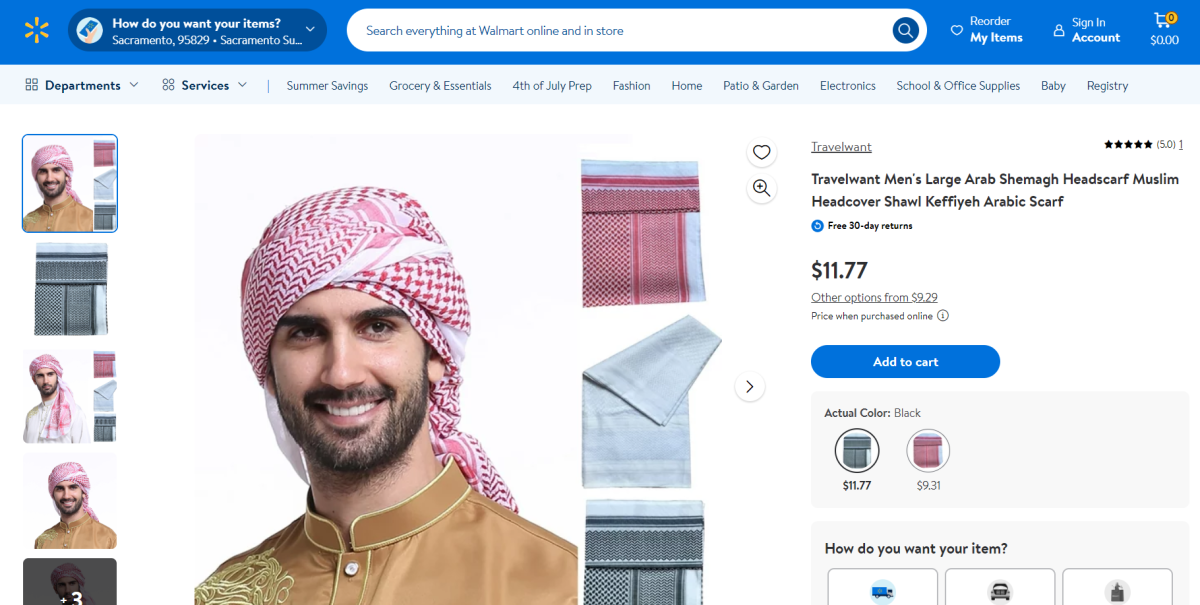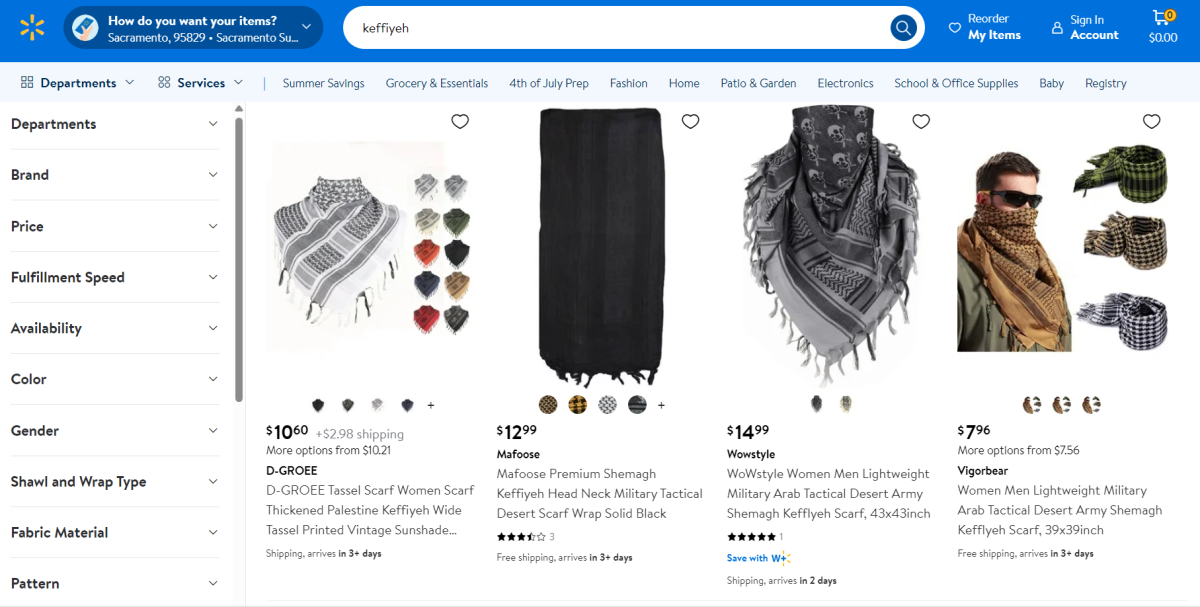Walmart has been accused of "irresponsible" behavior over the sale of scarves which critics have suggested glorify combatants in the Israel-Hamas conflict.
Campaigners have told Newsweek that advertisements for the Keffiyeh-style scarves "raise concerns about the commodification of a complex and sensitive conflict."
The garments, described as "Lightweight Military Arab Tactical Desert Army Shemagh KeffIyeh" scarves, have also provoked controversy on social media.

One Instagram user warned that they risk "dehumanizing Arabs", while another wrote: "How many times do we have to tell these people that our culture is not a costume?".
The Keffiyeh, commonly associated with Palestinian nationalism, is a traditional Middle Eastern cotton headscarf with a distinctive chequered pattern.
The model Bella Hadid, whose father is Palestinian, made headlines in May for wearing a Keffiyeh dress. She later posted a picture of it with the message "Free Palestine For Ever".
Controversy surrounding the scarves began after a post shared on the Instagram account for The Slow Factory, a non-profit organization.
The post, which has now garnered over 47,000 likes, reads: "Walmart launches the 'Freedom Soldier Scarf Unisex' a keffiyeh-inspired scarf and we are confused.
"It is absolutely out of control that we even need to say this but: dehumanizing Arabs while in the midst of an active genocide against Arabs is inhumane and evil. Full stop."
Walmart has said it will remove the scarves after Newsweek brought the matter to its attention.
"Like other major online retailers, we operate an online marketplace that allows outside third-party sellers to offer merchandise to customers through our eCommerce platform. These items were listed by third-party sellers and are in the process of being removed from our marketplace," a spokesperson said.
Hatem Abudayyeh, the National Chair of the U.S. Palestinian Community Network (USPCN), told Newsweek that "the inclusion of the keffiyeh under the branding of military scarves is clearly problematic and that "the choice to carry the keffiyeh, [is] clearly a business decision and not a political one, cannot be separated from the worldwide upsurge of support for the Palestinian people."
A spokesman for the Committee for Accuracy in Middle East Reporting and Analysis (CAMERA) told Newsweek: "The pattern of the Keffiyeh could be associated with the Palestinian national struggle as a whole, but it could also be associated with specifically the armed struggle, not only peaceful resistance, but also armed resistance and not only armed resistance, but armed resistance against civilians.
"A person that buys this kind of scarf, calling it in a way a military scarf, or by a name that evokes militant and weapons does associated by this act, does associate this item, this accessory, with an armed struggle."

The spokesman added: "Many of the icons that we know that wore Keffiyehs in the past, in the 1970s for example, were people who targeted civilians."
The charity Islamic Aid said it was "aware of the controversy surrounding the sale of Desert Army Scarves and Free Soldier Scarves" at Walmart.
They continued that, "these products do raise concerns about the commodification of a complex and sensitive conflict."
A spokesman for the Committee for Accuracy in Middle East Reporting and Analysis (CAMERA) told Newsweek that the association of these scarves only with armed struggle "did not start with Walmart selling the product, but if we're ever to reclaim it as more of a peaceful item. This is not the way to do this."
They added: "I think the way they label them [the scarves] is irresponsible."
A spokesperson for Campaign Against Antisemitism told Newsweek: "Following Hamas' barbaric attacks of 7th October, there has been an increase in popularity of apparel that could be considered hostile to the Jewish community.
"Retail platforms cannot shirk their responsibility to know what is being sold on their websites and platforms, and they have a social responsibility to assess the impact of those items on communities and the public."
The current conflict in Gaza was triggered by Hamas's October 7 attacks, in which 1200 people were murdered and 253 were taken hostage.
Following Israel's retaliation, 37,396 lives have been lost in the Gaza strip so far, according to the UN Office for the Coordination of Humanitarian Affairs. Israel disputes the figure.
Do you have a story we should be covering? Do you have any questions about this story? Contact LiveNews@newsweek.com
Uncommon Knowledge
Newsweek is committed to challenging conventional wisdom and finding connections in the search for common ground.
Newsweek is committed to challenging conventional wisdom and finding connections in the search for common ground.
Bagikan Berita Ini














0 Response to "Walmart Under Fire Over Scarves That Evoke Israel-Hamas Conflict - Newsweek"
Post a Comment